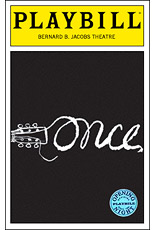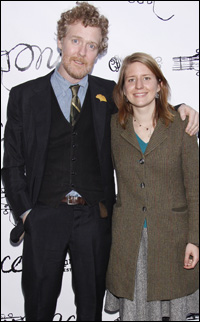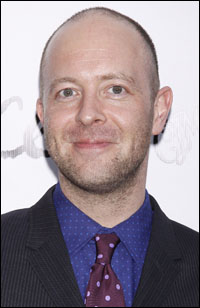
*
St. Paddy's Day went into extra innings March 18, with a Dublin pub on stage at the Jacobs dispensing brew before, and midway through, the opening of Once.
Early arrivals—and those who'd seen the show Off-Broadway at the New York Theatre Workshop—bellied up to the bar, which was free and free-flowing, while other first-nighters and assorted celebs clustered unawares in front of the theatre.
Glen Hansard and Marketa Irglova, who starred in—and song-scored--the 2006 cult indie smash on which the show is based, made their way through the paparazzi pandemonium into the theatre, both trying their best (and unsuccessfully) to not look like Cinderella at the ball. Theirs was a miracle movie, made in 17 days for $200,000 and grossing almost into the rarified eight-digit area.
Not the least of its selling points was their urgently soaring song, "Falling Slowly," which wound up winning 16 international awards out of 20 nominations, including the Oscar for Best Song of the Year. It was a true collaboration. He started off with a melody, and she suggested the three-note increment that stretched the heart of the song. She also stepped aside and let him take the main melodic line because she thought it wore better on his voice, joining in with some perfectly pitched backup. There are 15 more numbers where this came from, and the show ticks them off, bookended by "Falling Slowly," exquisitely delivered both times by the stage facsimiles for Hansard and Irglova, Steve Kazee and Cristin Milioti.
Both are actors first, working in a musical-theatre situation and executing a gentle, Everydude sort of a story. Guy, a guitar-strumming street busker on a break from his da's vacuum-cleaner repair shop, meets Girl, a piano-playing Czech single-mom with a broken vacuum cleaner. They handily strike a deal—her music for his repairs—and a collaboration, personal as well as professional, is born. The bittersweet hitch is that they communicate feelings in song without committing to them in real life.
[flipbook] Originally, the screenplay by the director, John Carney, was mostly his own story but, in the playing and living of it, became something of a reality for the two actors. Although Hansard and Irglova ran the press gauntlet together, his girlfriend and her husband were waiting in the wings. Their coming-together and coming-apart got candidly chronicled in a post-script documentary to "Once" called "The Swell Season," covering their chaotic U.S. tour after they scored the Oscar.
The big scene-stealer in "The Swell Season" is not a musician but Hansard's mom, who is constantly busting her buttons over her son's Oscar. And, yes, as a matter of fact, she was a beaming presence at his Broadway debut—in spades.
Irglova had some kin in attendance as well. "I am really thrilled to be here and to have brought my family over here to see it," she admitted happily, "and I'm very proud of those guys who've done the play. It's their accomplishment, actually."
Hansard did a little dirt-kicking, also. "It feels amazin'! It's such a bizarre, beautiful, kinda odd honor to be here. The whole thing is about done now, so we're just here to show our support in the audience with our fists in the air. Really, it's theirs now."
The idea of turning this quiet little charmer of a film into a Broadway musical belongs to John N. Hart Jr., who produced it (in association with New York Theatre Workshop) and with the Frederick Zollos (Barbara Broccoli), The Shubert Organization, Patrick Milling Smith, Brian Carmody, Michael G. Wilson, Orin Wolf and Robert Cole—major stretcher-bearers for such a fragile piece.
"When I saw it in a movie theatre and was moved by it, I thought, 'Music is part of a three-dimensional medium, and film is two-dimensional. If anything belonged in a theatre, it was this.' Getting it right was the challenge, and John Tiffany got it right."
A major force at the National Theatre of Scotland, Tiffany was an offbeat bet for Broadway. His Olivier Award-winning Black Watch at St. Ann's Warehouse and The Bacchae for the Lincoln Center Festival are as close as he has come.

Buy this Limited Collector's Edition |
Alan Cumming, who made his entrance in that Bacchae, dangling upside down by his ankles from the flies at the top of the theatre, wearing a kilt, made a more conventional, ground-bound entrance to the Once premiere. He next has dubs on the undivided attention of Tiffany, who'll direct him in Macbeth—like, all the characters in Macbeth, even the good wife.
Stars came from half a block away for the opening—Michael Cerveris from Evita, now previewing at the Marriott Marquis, and Judith Light from Other Desert Cities, still selling out at the Booth. Coming from the other direction, weeding through the matinee mob outside the Hirschfeld was Nick Jonas ("I made sure I said hello to as many as I could before I came here—I hear this is great"). Easily, the best commute was made by Alan Rickman, who still has two weeks to go on his Semester run next door at the Golden.
Kristin Chenoweth, who's being feted all over the place these days ("Maybe I'm going to die, and nobody told me"), said that she's getting geared up for a tour of 22 cities all across the country (including New York City Center on June 2), starting May 9 in Seattle and ending June 25 in her Oklahoma hometown of Broken Arrow. She liked both movies with that title, "but I wish somebody would make something about our actual town." Enjoying a girls-night-out with her was Chitty Chitty Bang Bang's Erin Dilly, whose hubby Stephen Buntrock is back from his White Christmas tour and babysitting their two kids.
Director Gregory Mosher was an early arrival, still vibrating from the arrival of the Mike Nichols Death of a Salesman three days earlier. "How great was that!" he exclaimed. "That was really special. I had the great pleasure of sitting next to Zoe Caldwell. Her husband produced Dustin Hoffman's Death of a Salesman, so it was like sitting with family. Zoe was so moved, as was I. It's impossible not to be really knocked out. I wrote Mike the next day. I said, 'You just reminded everybody how to do it and why to do it.'" Other directors at the opening were Jack O'Brien and Michael Wilson, along with producer Nelle Nugent, Mormon comedian Emmett Foster, Shubert chairman Philip J. Smith and original Jersey Boys Daniel Reichard and J. Robert Spencer.
 |
||
| Glen Hansard and Marketa Irglova |
||
| Photo by Joseph Marzullo/WENN |
"I just want to take a few seconds here to, er—," the actor began, then stopped abruptly when he realized that he was still speaking with his brogue. "Sorry, it takes me a few minutes to get out of the Irish—to take a few seconds to bring some people up. I hope I still have a job on Tuesday after I do this, by the way."
He began with the genesis pair. "There's absolutely no way that any of us would be here tonight—and I know, for me, especially." His voice broke here with feeling, and he paused for composure. "For me, they made such a profound effect on my life five years ago—well, six years ago now—when I saw their film in a tiny, tiny, little theatre here in Manhattan, and I immediately told everybody I knew that it was the most amazing piece of art. I never, ever expected that this moment would come around the way it has. It's all very weird and nightmarish and beautiful."
It took two miraculous minutes of loud and protracted applause for Hansard and Irglova to reach the stage and individually hug 'n' kiss their receiving line of actors.
"The next two I'm going to call—," he announced, seemingly aware of time restraints, "maybe I'll just do this in pairs all the way down the line. The reason I'm going to bring them both up at the same time is because, as a big-time lover of theatre, I know that a lot of the shows that I've seen that I thought were so beautiful and so stunning to look at are because of these following two people, and I have to say—I know people always say these kinds of things, but I don't know if I have ever worked with a better design team in my existence. They're both so kind and so capable and so giving and so level-headed and never made it look like it was difficult."
The teamwork of Bob Crowley (scene and costume design) and Natasha Katz (lighting design) couldn't have been better called. They occupy important equal billing on the same line, directly under the cast, on the Playbill title page.
Crowley confined this unwieldy storyline to a single set—a spot-on, richly detailed-in-the-ordinary Irish pub, replete with a mirrored bar where patrons can indulge in moments of justified and unjustified narcissism. It smacks of years of research.
When scenes shift to more intimate settings—a living room, a bedroom, a recording studio—this is achieved with the shifting of a little furniture and big yellow squares of light thrown on the barroom floor by Katz to suggest room boundaries. At one point, the young lovers stroll romantically along a platform above the bar and look down over the golden-flickering spectacle of Dublin by night. Very smart work!
 |
||
| John Tiffany |
||
| photo by Joseph Marzullo/WENN |
"One person who has been a part of this company since Cambridge as well—and, in a special way, has been a part of this company—is a member of the department of dance." Yasmine Lee took to the stage with a graceful buoyancy that betrayed her trade, which didn't make the title page but was identified in agate in the full list of credits as movement associate, a key slot in this particular production.
Billing plainly didn't matter much here. Every time a name was announced, wild whoops of joy went up as if somebody at one's table had just won a Golden Globe.
Kazee gamely pressed on, voice quaking and breaking, toward the show's primal contributors. "So this person—I don't know even how to begin to describe what an effect he has on all of us up here. We miss him so much when he's not around, and, when he's here, the time is so precious. I'm so thankful to call this person a friend. He gives us these beautiful and hilarious and poignant and depressing lines to say."
This would be Enda Walsh, pronounced the masculine Irish way: "Endo." He is the prolific London-based playwright who also scripted "Hunger," the film in which Michael Fassbender played the dying Bobby Sands. It's logical to assume that sunny banter doesn't come easily with him, but here he managed to punctuate this decidedly somber love story with sudden shafts of wit and humor.
Then came "another person here who, from Day One, I knew was going to be one of my favorite people because he has an energy that is hard to ever surpass in this world. He is such a special human being, and it radiates from inside of him to all of us and through this music that you hear tonight, and that is Martin Lowe." One had to check the title page for his credits: music supervisor and orchestrations.
"I've got two more, and it's going to be a miracle if I can get through," Kazee said, batting back tears. "I can't tell you what profound effect on my life—and, I'm sure, everyone else's life--the next two people have. I will bring them up one at a time."
The word genius that's so easily tossed about this business, according to Kazee, applied to the man credited simply (only not so simply) with "movement." "When we did this as a workshop, he took the simplest things and made them into the most profound, beautiful moments that I've ever seen. I'm a huge astrophysics nerd, and there's this whole concept of creating something out of absolutely nothing. That's what this guy does for a living, and you will be hearing about his name for years to come because he is setting a standard for what we call choreography in the same way that shows like Oklahoma! changed the face of the world as well."
True to his trade, Steven Hoggett charged the stage exuberantly, tearing down the growing line of co-workers, high-fiving every one of them and lingering (as most did) over the pint-sized pixie who played Milioti's seven-year-old daughter.
"And last, but certainly not least, I'm sure that I speak for everyone here when I say that I have never been in the presence of a more gracious and sweet—"
The words finally stopped coming here for Kazee, so, while he waited for them to return, Milioti, standing beside him, filled the dead air by peeping a suggestion: "man." It brought a laugh from the audience and gave him proper time to recover.
He manfully entered the homestretch: "I can't describe what this person has meant to me in my life—and I'm sure everyone else's—but it's so much deeper than a director and so much deeper than a creator of theatre. He is everything to me, and I will forever be thankful to him for this opportunity and for taking us all along.
"We are in a business, and we all understand this, okay? Names sell tickets. I get it. We all understand that, but this man put a cast together of a bunch of nobodies—myself included in that. I always refer to us as the Island of Misfit Toys. We're all so unbelievably broken in so many beautiful ways, and, when we come together, we make such great music, and it's a beautiful thing. But I must tell you right now that John Tiffany stood up for every one of us. He stood his ground, and he said he didn't give a sh*t about names and he didn't give a sh*t about celebrities."
At this junction, Milioti protectively cupped the tender ears of the tyke beside her, again effortlessly getting a laugh, while Kazee raced to the finish line. "What he cared about was this piece of art, and that's what we have here—a piece of art."
With that, director Tiffany bolted onto the stage and emulated—only campier—his joined-at-the-hip collaborator, Hoggett, by racing down a line of outstretched palms.
No mention was made of the diligent dialect coach (Stephen Gabis), who had made it so hard for Kazee to dump the brogue at the top of his introductory spiel.
The evening ended with three more minutes of sustained applause, giving the cast of 13 and the 10 new additions a chance to compose themselves, form a straight line and do a long, deep, grateful bow of appreciation to the crowd. It may just be the longest curtain call since the last Show Boat docked on Broadway and Hal Prince insisted on shaking a small city out of the vessel and onto the Gershwin stage to show the audience how many people it takes to make a show.
The thing about Once is that nobody sat down, making Kazee's "few seconds"—which weighed in at 12 minutes and 15 seconds—arguably the longest standing ovation ever accorded a Broadway show. What say you, Mr. Guinness?
(To read about the December 2011 Off-Broadway opening of Once at New York Theatre Workshop, click here.)







































































